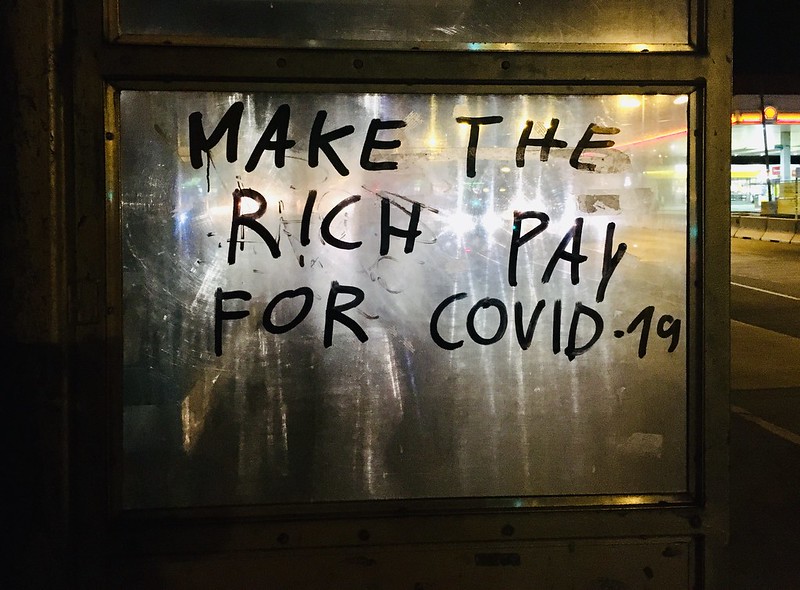
The covid-19 pandemic is one of the most serious crisies faced by humanity at least in the last 50 years. It has had an impact on every country and individual in the world and the initial outbreak left our globalized world at a standstill and nearly 5.5 million people dead with nearly 300 million people infected globally to date. Now in 2022, 2 years after the initial outbreak we have developed vaccines and tried to create a system to manage the spread of the virus and yet we are currently in the midst of the second biggest rise in cases since the initial surge thanks to the emergence of new more transmissable variants.
In this time we have heard pledges from governments around the world to do their best to protect us and bring and end to the pandemic with the promise to emerge from it with a new social and economic model. Different governments have had different rhetoric and slogans for this such as, “build back better” “The green recovery” and “The brand new deal” . The premise of these is similar in that the governments want to take this slowdown and halt to society and the way of life as we know it as a chance to make changes to the social and economic structures of our lives to one that is more fair, resilient and able to address climate change.
Bodies such as the UN have published Covid-19 responses and platforms which aim to guide and instruct how to seize oppertunities provided by the pandemic in line with the SDG’s and achieving them. The OECD has also created a platform to measure and monitor all the pledges and promises by the OECD member countries and if they are on track to meeting climate goals and delivering the better future promised.
When assessing the impact of the pandemic on society we can see that it has unequally impacted different sectors of society and is more severe in undeveloped countries. One small positive impact that happened was that global emissions dropped during the initial lockdown by about 5% and this was all as result the halt in ground transport, commercial flights and economic slowdown. However this was short lived and now emissions have rebounded faster than expected and seem to be growing faster than ever which is not in line with the recovery pledges. It seems women have been impacted worse by the pandemic as they have been forced to take on unpaid care work and being the main frontline workers in healthcare (UN, 2021). Poorer countries have also not been able to take many of the same precautions offered to developed countries such as, social distancing as people in developing countries tend to have far more people in one household. In adition simple practices such as hand washing are not readily available due to lack of running clean water.
When looking at the realities of the pandemic recovery so far the green recovery is falling far shorter of what was promised. The OECD states that its 44 countries and the European Union pledged a total of 677Bn US Dollars which have had a positive impact and will contribute to building back greener. However, the majority of this is to be used on energy production and transport which is good as its a large emitter of GHG emissions but it is worrying that there is almost no or very little dedicated to agriculture, forestry, biodiversity and waste and recycling which is going to be a huge issue with the increase of meidcal waste and PPE waste such as face masks. What makes this pledge seem ever more insignificant is that the total pledged recovery spedning is 3200Bn USD and the OECD claims 320Bn of that will have negative or mixed impacts to a green recovery. This you can argue will actually reduce the efficiency of the green pledge to 347Bn Dollars.
Not to make this blog post too long I will summarise that the Covid-19 Pandemic has given us the chance to pivot the trajectory of humanity to one that is more fair, just and sustainable. However, so far country pledges and politicians have not delivered a green recovery but rather are hastily rushing to try get us back to living the way we were before. Vaccine rollouts have been unfair to the global south who have been denied the right to patents to produce their own vaccines in favor of profit. The workfore has battled for the right to work from home and the possibility of a 4 day work week seems like a reality but this is not accesible to people in developing countries who do not have sufficient internet and electornic access to work and learn from home. The pandemic is still far from over though so there is still oppertunities for society to demand more from its governments and demand a green just recovery.
References
BBC News. 2022. Climate change: Carbon emissions show rapid rebound after Covid dip. [online] Available at: <https://www.bbc.com/news/science-environment-59148520> [Accessed 4 January 2022].
Le Quéré, C., Jackson, R., Jones, M., Smith, A., Abernethy, S., Andrew, R., De-Gol, A., Willis, D., Shan, Y., Canadell, J., Friedlingstein, P., Creutzig, F. and Peters, G., 2020. Temporary reduction in daily global CO2 emissions during the COVID-19 forced confinement. Nature Climate Change, 10(7), pp.647-653.
OECD. 2022. Focus on green recovery. [online] Available at: <https://www.oecd.org/coronavirus/en/themes/green-recovery> [Accessed 4 January 2022].
OECD. 2022. Gender-relevance of policies in the OECD Green Recovery Database. [online] Available at: <https://www.oecd.org/coronavirus/policy-responses/gender-relevance-of-policies-in-the-oecd-green-recovery-database-e6a03378/> [Accessed 4 January 2022].
OECD. 2022. The Annual Climate Action Monitor. [online] Available at: <https://www.oecd.org/climate-action/ipac/the-annual-climate-action-monitor-5bcb405c/#section-d1e242> [Accessed 4 January 2022].
Un.org. 2022. Everyone Included: Social Impact of COVID-19 | DISD. [online] Available at: <https://www.un.org/development/desa/dspd/everyone-included-covid-19.html> [Accessed 4 January 2022].